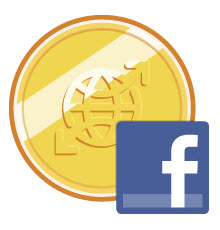
The discussion at a session at the f8 developer conference focused on how Facebook Credits can be used as a virtual currency in games, which you play for free but pay for specific virtual items with the virtual currency, which you buy with real money.
[aditude-amp id="flyingcarpet" targeting='{"env":"staging","page_type":"article","post_id":177280,"post_type":"story","post_chan":"none","tags":null,"ai":false,"category":"none","all_categories":"business,games,social,","session":"A"}']There are more than 10,000 game apps on Facebook. There are about 200 million users who play a game at least once a month on Facebook, and, on average, all of those users play four different games in a month. Hence, there are roughly 800 million game sessions a month on Facebook, said Facebook Credits manager Deb Liu.
AI Weekly
The must-read newsletter for AI and Big Data industry written by Khari Johnson, Kyle Wiggers, and Seth Colaner.
Included with VentureBeat Insider and VentureBeat VIP memberships.
Mark Zuckerberg, chief executive of Facebook, explained earlier today that the goal (beyond the more obvious goal of making money via a 30 percent fee that Facebook gets for every Facebook Credits transaction).
“You may not believe me when I say this,” said Zuckerberg. “We are doing it for developers. But it’s not a revenue opportunity anytime soon. Ads are a very good business.
“With credits, it becomes easier for people to buy things across apps. Rather than being locked into one app that has their credit card, they can buy in any app. This is a canonical economics example where it makes sense to have a standard and have just one, or a few, and that ends up being better for everyone. There is a lot of overhead for us doing this ourselvess. It’s a lot of hard work. We don’t expect it to be profitable for a period of time.”
In a question and answer session about Facebook Credits, developers were clearly disturbed with the plan for Facebook to keep 30 percent of every transaction. Liu said every transaction will have the 30 percent fee, with no exceptions. If your game generates $1 billion in revenue, Facebook will keep $300 million of that.
Still, this complaint is not stopping the app publishers from trying it out, particularly as a secondary form of currency, in addition to a virtual currency that is unique to a game or app. Almost all of Facebook’s major game companies, as well as some small ones, are trying the credits out.
[aditude-amp id="medium1" targeting='{"env":"staging","page_type":"article","post_id":177280,"post_type":"story","post_chan":"none","tags":null,"ai":false,"category":"none","all_categories":"business,games,social,","session":"A"}']
Very few people in a crowd will bother with entering their credit card information for an online purchase. Once they have done that, they are 40 percent to 60 percent more likely to buy something. And if they have a full virtual wallet, they are even more likely to buy something, Liu contended.
Facebook wants to launch formally in June and that there are more than 100 apps testing it already. Crowdstar co-founder Jeff Tseng talked about how the test has worked out so well with his company’s games that he has expanded the beta test of Facebook Credits to the company’s top four hit games.
Facebook itself is going to seed free Facebook Credits at the outset to get users in its social network to use them. Right now, there might be 1 percent to 3 percent of users willing to spend money on virtual goods in a free game. Liu said the goal of Facebook Credits is to grease the system so much that 8 percent to 20 percent of users will spend money.
[aditude-amp id="medium2" targeting='{"env":"staging","page_type":"article","post_id":177280,"post_type":"story","post_chan":"none","tags":null,"ai":false,"category":"none","all_categories":"business,games,social,","session":"A"}']
Users can still use a variety of payment methods when buying Facebook Credits. They can use a credit card, PayPal, mobile payments such as Zong, and special advertising offers (via TrialPay, where users can earn credits by purchasing flowers or sign up for a subscription).
Facebook also argued that it can improve liquidity for developers. It can offer services such as “auto-top,” which automatically refills someone’s virtual currency wallet if the amount in the wallet drops below a certain threshold. That removes friction because the user will be more likely to buy something if they have a full wallet.
Often, users have to make a minimum purchase to get virtual currency in one game. If they are just testing the waters of a game, they may not want to commit themselves to spending $5 on that game. With credits, they don’t have that barrier, since they know they can use that currency anywhere.
[aditude-amp id="medium3" targeting='{"env":"staging","page_type":"article","post_id":177280,"post_type":"story","post_chan":"none","tags":null,"ai":false,"category":"none","all_categories":"business,games,social,","session":"A"}']
“You can sample games without committing a certain amount of money,” Liu said.
“In the end, we are pretty happy with it,” Tseng said.
Facebook is being very cognizant of gambling laws, which classify your game as a regulated gambling activity if you allow users to cash out any currency they win in a game. Hence, you won’t be able to cash out Facebook Credits currency, or sell it second-hand, under Facebook’s rules.
[aditude-amp id="medium4" targeting='{"env":"staging","page_type":"article","post_id":177280,"post_type":"story","post_chan":"none","tags":null,"ai":false,"category":"none","all_categories":"business,games,social,","session":"A"}']
To join the beta, developers can send an email to credits-onboarding@facebook.com.
Is it fair for Facebook to take the 30 percent cut? Take our poll below.
Is it fair for Facebook to take a 30 percent cut on Facebook Credit transactions?online surveys
VentureBeat's mission is to be a digital town square for technical decision-makers to gain knowledge about transformative enterprise technology and transact. Learn More
